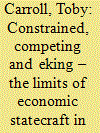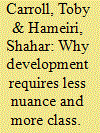| Srl | Item |
| 1 |
ID:
192158


|
|
|
|
|
| Summary/Abstract |
This paper highlights the highly contingent and constrained possibilities for states concerned with gaining and maintaining economic and, relatedly, strategic advantage in East Asia in a world dominated by global value chains (GVCs) owned and controlled by transnational capital. While the reorganisation of production has given rise to new contender states such as China, challenging the economic and strategic positions of others, the ability for states to engage in non-market conforming behaviour designed to reduce technological dependence, accumulate reserves and embolden national positions against competitors is far more constrained than it once was. Prioritising the relative power and leverage of states operating in various contexts over time, three types of state are identified within contemporary East Asia: former developmental states under persistent competitive pressures compelling very different policy agendas to those that underpinned their respective development stories; a somewhat exceptional constrained “aspirant state”, attempting mercantilist strategies to achieve strategic upgrading under the spectre of systemic exclusion and formidable domestic challenges; and, finally, relatively vulnerable “eke-out” competition states, attempting to leverage labour cost, geography and regulation to maintain economic relevance within the context of hyper competitiveness while also engaging in forms of quarantining and patronage. Our overarching argument is that the latitude to both pursue and leverage ES strategies common in the past is all but gone, even for the most powerful of contender states.
|
|
|
|
|
|
|
|
|
|
|
|
|
|
|
|
| 2 |
ID:
100313


|
|
|
|
|
| Publication |
2010.
|
| Summary/Abstract |
Via an analysis of the trans-ASEAN gas pipeline project (TAGP), in this article we argue for a reconceptualising of the regional dynamics of Southeast Asia and the forces shaping them. For this task, we propose an analytical framework based upon social conflict theory that delves within and beyond the state, and which places emphasis upon the roles of both material and ideological factors operating across time in the reordering of particular geographical spaces. The framework reveals that the tensions acting within and upon ASEAN and the TAGP influence regionalism in such a way that the gas pipeline project - much like other 'regional' projects - is unlikely to ever come close to fulfilling its brief of enhancing regional security and cohesion. What is more probable is that the project's form will continue to be conditioned by entrenched politico-economic realities and the influence of dominant ideologies - factors which have the capacity to exacerbate existing regional animosities and disparities.
|
|
|
|
|
|
|
|
|
|
|
|
|
|
|
|
| 3 |
ID:
079847


|
|
|
|
|
| Publication |
2007.
|
| Summary/Abstract |
The authors review critically an article by Patrick Kilby in Vol. 61(1) of the AJIA on Australian development policy. They claim that the difference between the Government's program and the alternatives suggested by Kilby is one of degree as his objections retain the same neoliberal limitations as AusAID and the Washington Consensus. The authors argue that reducing poverty in a globalized world means going further than institutional changes and considering the key issue of class. They instead suggest a focus on the effect of domestic international politics and the globally constituted nature of poverty.
|
|
|
|
|
|
|
|
|
|
|
|
|
|
|
|